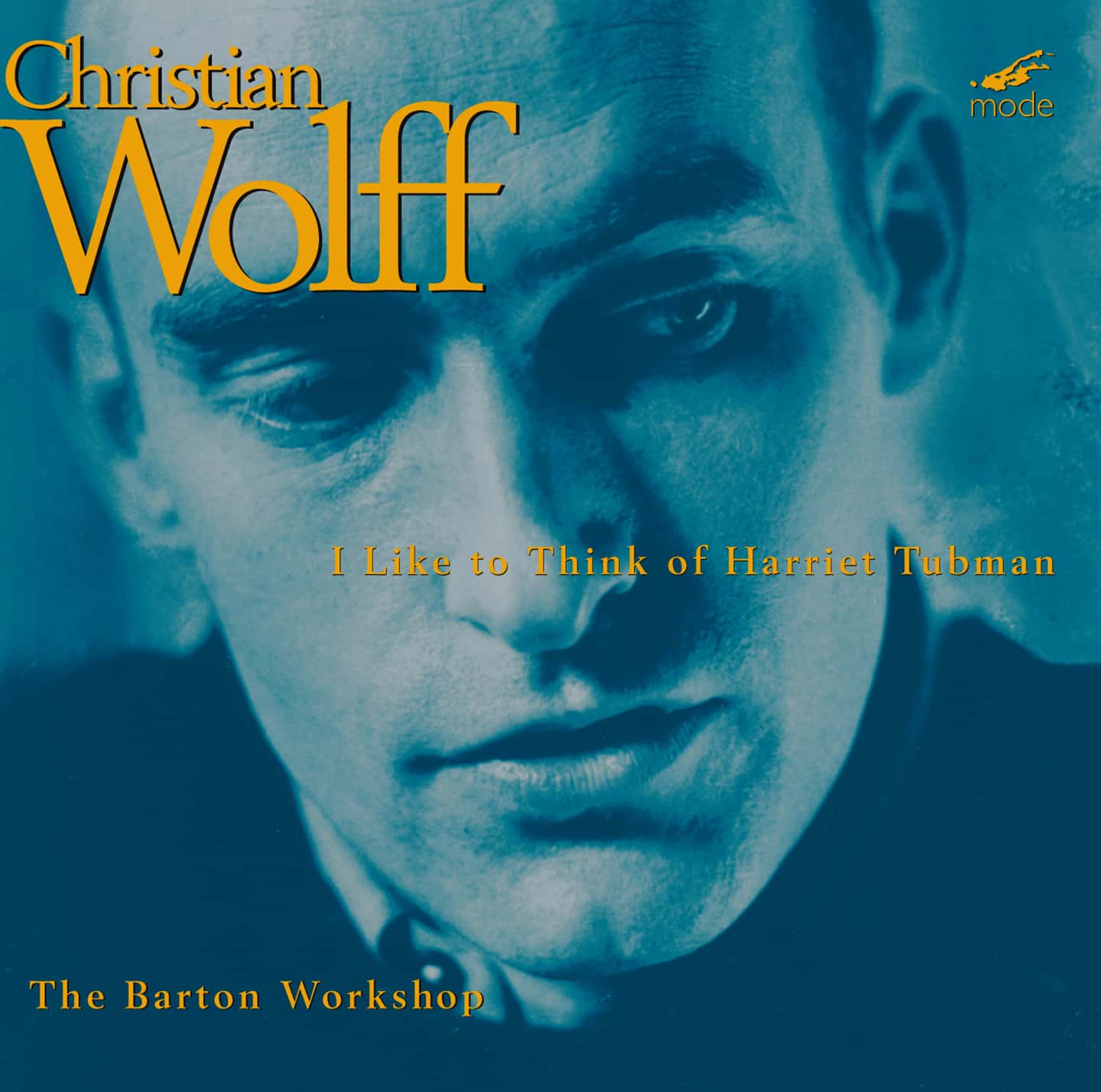Wolff Edition 2 - I Like to Think of Harriet Tubman
Piano Trio (1985) *
violin, cello and piano
Greenham (4:48)
Seneca (1:42)
Camiso (3:31)
Download the MP3 sample (773KB)
I Like To Think of Harriet Tubman (1984) * (6:05)
woman’s voice, violin, clarinet, contrabass
Download the MP3 sample (1,628KB)
Duo for Violinist Pieces (1984) * (6:16/5:56)
violin and piano
Eisler Ensemble Pieces (1984) * (5:25)
flute, clarinet, cello and piano
Serenade (1950) * (5:25)
flute, clarinet and violin
Download the MP3 sample (890KB)
Piano Song (I am Dangerous Woman) (1983) (8:56)
piano solo
For Morty (1987) * (5:34)
vibraphone, glockenspiel and piano
Download the MP3 sample (1,619KB)
Stardust Pieces (1984) * (5:34)
cello and piano
The Barton Workshop
James Fulkerson, conductor and director
* First Recording
Wolff is considered a member of “The New York School” along with John Cage, Morton Feldman, Earle Brown and David Tudor. Following his meeting Cornelius Cardew and Frederic Rzewski in 1970s, his music has evolved to embrace a distinct language which resonates with a deep commitment to political and social concerns. This collection of chamber works tracks his various styles over a long time span.
Among the highlights:
- The Serenade of 1950, an extraordinarily individual work from a sixteen-year-old who had just introduced himself to Cage. It intimates movement which was to come a decade later.
- I Like to Think of Harriet Tubman (1984) is a powerful setting for a woman’s voice with violin, clarinet and doublebass. The text by Susan Griffin tells of Tubman (1821-1913), an ex-slave who risked her life and freedom to bring others out of slavery via the ‘Underground Railway’.
- For Morty (1987), written in memory of Morton Feldman, uses three instruments that have a particular significance in Feldman’s work – the vibraphone, glockenspiel and piano. Its tender fragility reminds one of the unique sensibility of Feldman, while remaining music that only Wolff could have conceived.
The superb performances come from The Barton Workshop, an Amsterdam based ensemble founded in 1989 by composer-trombonist James Fulkerson. The artistic philosophy of the ensemble is to perform the leading edge of contemporary music today with a strong tradition of music by Wolff, Cage and Feldman. They have made many excellent recordings on the Etcetera label; this is their first on Mode.
Reviews
Christian Wolff
I LIKE TO THINK OF HARRIET TUBMAN – CHAMBER WORKS
The Barton Workshop
Mode 69
A true Leninist would argue that art in a smoothly running socialist state would become redundant and disappear, though while waiting for such a perfect society to come about, we have an idea of what socialist literature, painting, sculpture and cinema are like. But what does socialist music sound like? Luigi Nono? Eisler? Robert Wyatt? The Ex? Well, all four. and you may add Christian Wolff to the list. Like fellow experimental composers Cornelius Cardew and Frederic Rzewski, Wolff eventually decided to dedicate his art to bringing about precisely those social changes that post-1989 mobile phone culture has tried to have us believe are not necessary. However, while Cardew’s vision of free music with AMM gradually gave way to banal workers’ songs, and Rzewski ended up opting for the Romantic–and necessarily bourgeois–grand variation cycle for “The People United Will Never Be Defeated”, Wolff (born 1934) has been quietly working away at his own form of social struggle, evolving a musical language somewhere between Wolpe, Eisler and Copland. Wolpe and Eisler perhaps not surprisingly-the former was the adopted elder statesman of the New York School (Wolff has inherited his fondness for tight, cellular motives), while the latter was the perfect committed socialist composer, duly churning out reams of plodding grey music, athletic All-Bran for the masses. Wolff has unfortunately picked up a bit of East German roughage too, though with Copland’s ear for clean line and uncluttered texture, this music is a bracing walk through the New England countryside rather than a grueling sprint round an indoor track in some drab East German town. Quite what the masses would make of it is open to question–instead of taking his music to them and risking the blank incomprehension that met Luigi Nono when he took “La Fabrica Illuminata” to workers in an Italian car factory, Wolff has hidden himself away teaching that most erudite of subjects, classics, presumably devoting himself to composition in his spare time. Ultimately, whether this music works or not politically depends on your particular inclination–what is clear is that any disc of new work by this woefully under-recorded composer is most welcome, and minor quibbles such as Judith van Swaay’s funky English accent in the title track and the Barton Workshop’s rather dry, boxed-in acoustic don’t matter too much. Let’s hope Mode continue their rediscovery of Wolff’s music. Dare we hope for some Cardew soon too?
—Dan Warburton, Paris Transatlantic Review, November 2000
CHRISTIAN WOLFF PICKED #
2 BEST CLASSICAL RELEASE OF 1999
“I Like to Think of Harriet Tubman”, a disc of chamber works by Christian Wolff performed by the Barton Workshop (mode 69) was picked as the #
2 best classical release for 1999 by Damon Krukowski in Tower’s PULSE! magazine.
Christian Wolff, Chamber Works. The Barton Workshop
Mode 69
A marginal but engaging figure on the post-war scene, Christian Wolff’s output has a chameleon-like variety. This well-balanced recital ranges from the Webernian inscrutability of the early Serenade to the agit-prop earnestness of I Like to Think of Harriet Tubman, with the stylish Eisler transcription in between. Responsive performances.
— Richard Whitehouse, Gramophone, July 1999
Links
Also by Christian Wolff on Mode Records:
Vol. 1: The Piano Works 1976-83 performed by Sally Pinkas. (mode 43)
Vol. 3: Tilbury Pieces (complete) Snowdrop (mode 74)
Vol. 4: Look She Said: Complete Works for Bass (mode 109)
Vol. 5: Complete Works for Violin and Piano (mode 126)
Vol. 6: (Re):Making Music (mode 133/134)
Vol 7: Incidental Music & Keyboard Miscellany (286/287, 2-CDs)
The Barton Workshop Profile
Christian Wolff profile

